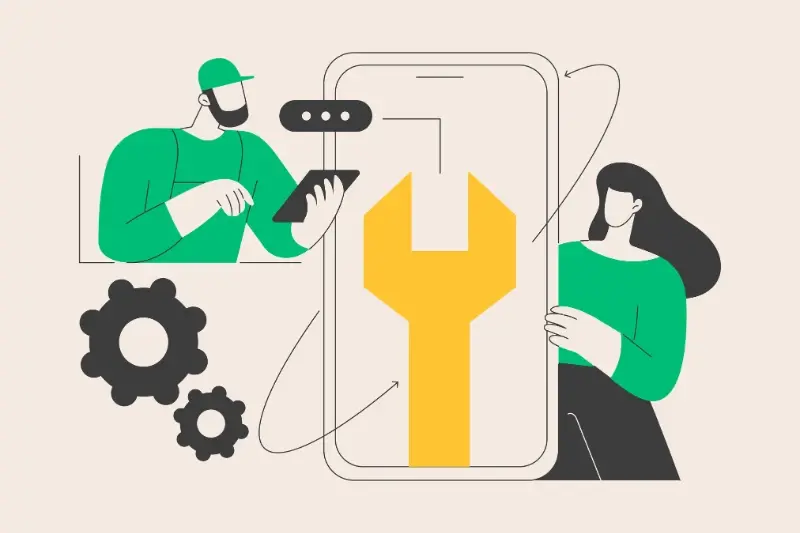The Mobile App Building Journey: Expectations vs Reality
Ever dreamt of creating the next big mobile app? Perhaps you've sketched out your brilliant idea on a napkin during lunch, convinced it'll revolutionise the way people shop, communicate, or even brush their teeth. We've all been there - that exciting moment when inspiration strikes and the possibilities seem endless.
The journey of building a mobile app is like cooking a gourmet meal - everyone thinks they can do it after watching a few YouTube videos, but the reality involves more preparation, skill, and patience than most imagine.
As an app development team that's guided countless ideas from concept to reality, we've noticed a fascinating pattern: the mobile app creation process often surprises first-time creators with its complexity. It's rather like expecting to build a shed but realising you're actually constructing a house - there's quite a bit more to it than meets the eye!
The reality of app building steps isn't meant to discourage you - quite the opposite. Understanding the true scope of realistic app development helps set proper expectations and leads to better outcomes. Whether you're a startup founder with a groundbreaking concept or a business owner looking to expand your digital presence, knowing what lies ahead is crucial.
In this guide, we'll walk you through the actual journey of creating a mobile app, addressing common misconceptions and sharing real experiences from our portfolio of projects. We'll explore everything from the initial planning stages to the final launch, helping you understand the genuine effort, time, and resources required to bring your digital vision to life.
Common App Development Myths vs Hard Truths
Let's have a cuppa and chat about some of those persistent myths that keep floating around the app development world. If you're anything like most of our first-time clients, you might be thinking, "I'll just need a programmer for a couple of weeks, and Bob's your uncle!" Well, not quite.
The "It's Just Like Building a Website" Myth
Picture this: you've built a lovely website using a drag-and-drop builder, and now you're feeling rather chuffed about tackling an app. The truth is, mobile apps are a different kettle of fish entirely. They need to work offline, handle device-specific features like cameras and GPS, and play nice with various screen sizes and operating systems. It's a bit like comparing making a sandwich to running a restaurant!
The "I'll Be the Next Instagram" Reality Check
We absolutely love your enthusiasm, but here's the thing: Instagram wasn't built in a weekend by a couple of mates in a garage. The first version was actually quite basic - no filters, no direct messages, just simple photo sharing. Most successful apps start small and grow based on user feedback and continuous improvements.
Another common misconception we often hear is that apps practically market themselves. While we'd love this to be true (wouldn't that be lovely?), the reality is that even the most brilliant app needs a solid marketing strategy. Think of it like opening a shop - you wouldn't just unlock the door and expect crowds to pour in, would you?
Understanding these realities isn't meant to discourage you - quite the opposite! When you start with realistic expectations, you're much better positioned to create something truly remarkable. After all, every successful app started with someone just like you, having a brilliant idea and the determination to make it happen.
The Real Steps Behind Mobile App Creation
Think of the mobile app creation process as baking a rather complex Victoria sponge. You can't simply throw all the ingredients in a bowl and hope for the best - there's a methodical approach that ensures success.
The Recipe for App Development Success
The journey begins with what we call the 'discovery phase' - understanding exactly what you want your app to achieve. Much like checking if you have all your baking ingredients before starting, this step helps avoid nasty surprises later in the app building steps.
Next comes the design phase, where we create wireframes (think of them as the architectural blueprints of your app) and then transform them into beautiful, user-friendly interfaces. This is where your app starts taking shape, similar to how cake batter begins to rise in the oven.
The actual development stage is where the real complexity of mobile app creation shows itself. Our developers write thousands of lines of code, carefully crafting each feature. It's rather like decorating a wedding cake - precision is everything, and rushing can lead to mistakes.
Before diving into development, create a simple flowchart of how users will navigate through your app. It's amazing how this basic exercise can reveal potential issues early on!
Testing and Launch
The final steps involve thorough testing (our equivalent of the taste test) and deployment to app stores. Just as you wouldn't serve a cake without ensuring it's properly baked, we don't launch apps without rigorous quality assurance. The realistic app development journey isn't a sprint - it's more of a carefully choreographed dance that requires patience, expertise, and attention to detail.
Time, Cost and Complexity: Setting Realistic Goals
Let's have a proper chat about the elephants in the room: time, money, and just how complex app development can be. If you're anything like most of our first-time clients, you might be thinking, "Surely we can knock this out in a few weeks for a couple thousand quid?" We hate to be the bearer of slightly less exciting news, but it's rather like expecting to build a house over a weekend with pocket change.
The Reality Check (But Don't Worry, It's Not All Doom and Gloom)
A simple app with basic features typically takes 3-6 months to develop properly, whilst more complex applications can stretch beyond a year. Cost-wise, think of it as buying a decent car - you're looking at starting from £20,000 for a quality basic app, with prices climbing based on complexity. Remember when Instagram started as a simple photo-sharing app? Even they needed several months and proper investment before their first launch.
Complexity: A Friendly Guide
We've developed a bit of a cheeky scale to help you understand complexity: - Basic apps (like a simple calculator): 2-3 months - Social networking apps: 6-12 months - Gaming apps: 8-18 months - Enterprise solutions: 12+ months
One of our favourite clients once came to us wanting to build "the next Uber" in six weeks. After a good cuppa and an honest discussion, we mapped out a realistic 14-month journey together. The result? An app that actually worked and didn't send drivers to the middle of the Thames. Sometimes, the best expectations are simply realistic ones.
Different App Types and Their Development Challenges
Just as you wouldn't compare baking a Victoria sponge to crafting a wedding cake, not all mobile apps are created equal. After eight years of bringing apps to life, we've seen firsthand how different app types present their own unique hurdles in the app creation process.
The complexity of an app isn't measured by its idea, but by the intricate web of features and interactions that bring that idea to life.
Understanding the Complexity Scale
Let's break down common app types by their development complexity (1 being simplest, 5 being most complex): - Basic calculators and simple tools (1/5) - Content-driven apps and basic games (2/5) - Social networking and messaging apps (3/5) - E-commerce platforms (4/5) - Real-time processing apps with AI/ML (5/5)
Real-World Development Scenarios
We once worked with a lovely chap who thought his quiz app would be a doddle to develop - "just a few questions and answers, right?" The realistic app development journey revealed the need for user authentication, progress tracking, leaderboards, and social sharing features. What seemed straightforward at first glance turned into a proper development undertaking.
The mobile app creation process varies significantly based on your app type. While a simple calculator app might take a few weeks to perfect, a full-fledged social platform could require months of careful development. Understanding these differences helps set realistic expectations and prevents the all-too-common "it's just an app" misconception that many first-time creators face during their app building steps.
Conclusion
Building a mobile app is rather like making the perfect cup of tea - it seems straightforward at first, but there's quite an art to getting it just right. Throughout this journey, we've unveiled the realities behind app development, separating the myths from the facts, and hopefully bringing your expectations more in line with reality.
Whether you're dreaming of creating the next revolutionary social platform or a simple utility app, understanding the true scope of app development is crucial. It's not about dampening your enthusiasm - quite the contrary! It's about equipping you with the knowledge to approach your project with confidence and realistic expectations.
Remember, every successful app you see today started with someone having a brilliant idea and facing similar challenges to what you might encounter. From WhatsApp's humble beginnings as a status update app to Angry Birds' 51 failed games before their breakthrough - persistence and realistic planning were key to their success.
As you embark on your own app development journey, keep in mind that it's perfectly normal to feel a bit overwhelmed. The path might be longer and more complex than initially imagined, but with proper planning, the right expertise, and realistic expectations, your app idea can indeed become reality.
And while we've covered quite a bit of ground here, remember that every app is unique, bringing its own set of challenges and opportunities. The key is to stay focused on your core objectives, be prepared for the journey ahead, and most importantly, enjoy the process of bringing your digital vision to life.
Share this
Subscribe To Our Blog
You May Also Like
These Related Stories

The Hidden Costs Of Mobile App Ownership Maintenance And Updates

Why Apps Die: The Maintenance Mistakes That Kill Mobile Apps





